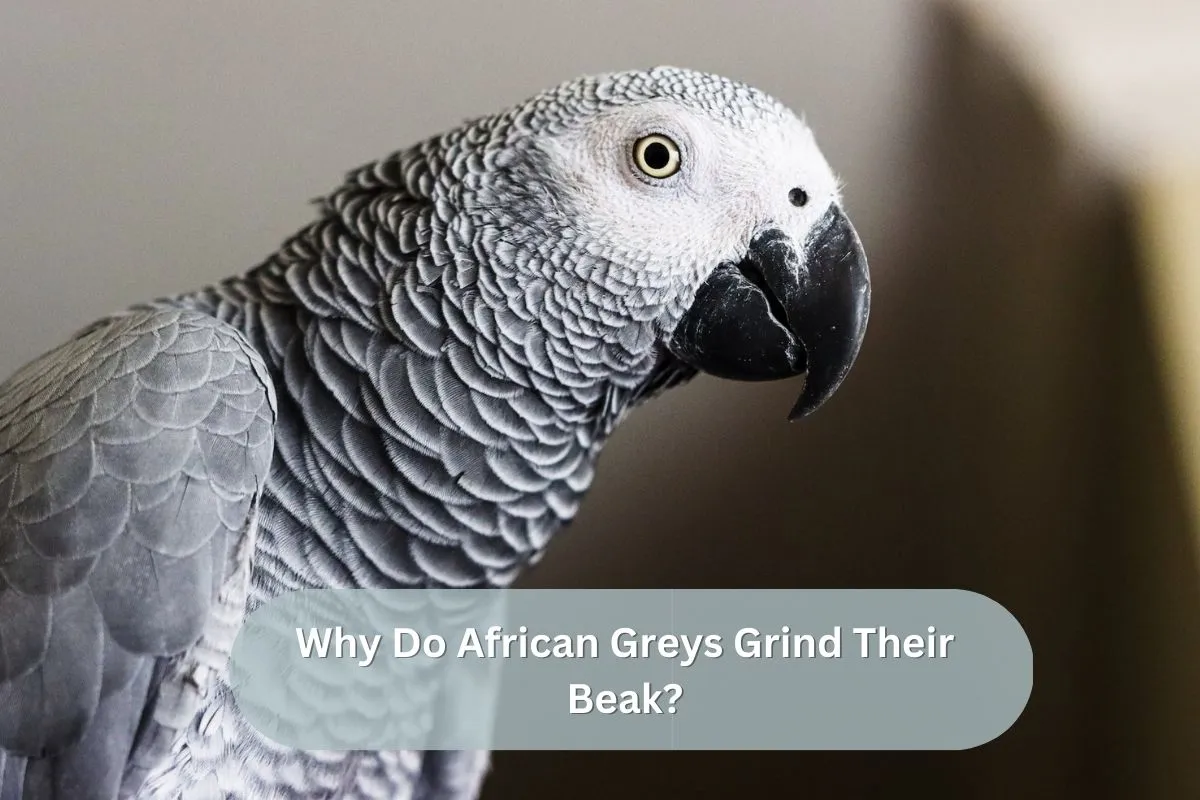One common behaviour among African grey parrots is beak grinding, also known as beak honing. This behavior can be alarming to some bird owners, as it may seem like the Bird is damaging its beak. However, beak grinding is normal and healthy for African grey parrots.
Why do african greys grind their beak? African grey parrots may grind their beak for several reasons. One reason is to maintain the sharpness and health of their beak. Grinding helps to wear down the beak and remove any rough or jagged edges.
In this article, we will discuss why African grey parrots grind their beaks and how to care for them.
Common causes of excessive beak grinding in African Grey parrots
- Nutritional imbalances or deficiencies in the diet.
- Lack of opportunity to chew and forage for food.
- Boredom or lack of mental and physical stimulation.
- Tooth or mouth abnormalities or infections.
- Stress or anxiety due to changes in environment or routine.
- Hormonal imbalances or reproductive issues.
- Physical injuries or abnormalities in the beak or jaw.
- Overgrown beak or beak misalignment.
- Age-related changes in beak growth and wear.
- Genetic predisposition to excessive beak grinding.
How to identify if your African Grey is grinding its beak excessively?
There are a few signs that may indicate that your African Grey is grinding its beak excessively:
- You can hear a constant grinding or clicking noise from your Bird’s beak.
- Notice that your Bird’s beak is shorter or more worn down than usual.
- Birds constantly chew on complex objects, such as toys or perches.
- They appear to be more irritable or agitated than usual.
- Your Bird has difficulty eating or drinking due to a misaligned beak.
If you notice the above signs, it’s important to observe your Bird closely and try to determine the cause of the excessive beak grinding. In some cases, beak grinding may be normal behavior’s for your Bird.
Still, if it appears to be excessive or is causing problems for your Bird, it’s essential to seek the advice of a veterinarian or an avian specialist. They can help determine the cause of the excessive beak grinding and provide recommendations for addressing it.
The relationship between beak grinding and stress in African Grey parrots
One way that parrots may cope with stress or anxiety is by grinding their beak. This behavior can serve as a way for them to release pent-up energy or to cope with boredom or frustration.
If your African Grey is grinding its beak excessively and you suspect that stress or anxiety may be a factor, it’s important to try to identify the cause of the stress and address it. This may involve providing your Bird with more mental and physical stimulation opportunities, such as interactive toys, puzzles, or playtime with you.
It may also involve changing your Bird’s environment or routine to reduce stressors, such as providing a more peaceful and comfortable space for your Bird to live in.
If you cannot identify the cause of your Bird’s stress or if the excessive beak grinding persists despite your efforts to address it, it’s important to seek the advice of a veterinarian or an avian specialist.
Is it painful for an African grey to grind beak?
In most cases, beak grinding is not painful for African Grey parrots. Beak grinding is a natural behavior’s that helps them maintain the proper length and shape of their beak, and it is typically done in small amounts regularly.
However, if a bird is grinding its beak excessively or if its beak is overgrown or misaligned, it can cause discomfort or difficulty eating and drinking. In these cases, it’s important to seek the advice of a veterinarian or an avian specialist to determine the cause of the excessive beak grinding and provide appropriate treatment.
It’s also important to note that beak grinding should not be confused with beak malformation, which is a condition in which a bird’s beak is deformed or overgrown. Beak malformation can be painful and can cause difficulty eating, drinking, and preening.
How often should an African grey parrot grind his beak?
It is normal for African Grey parrots to grind their beak on a regular basis as part of their grooming routine. Beak grinding helps them maintain the proper length and shape of their beak and keep it free of debris. However, it is not uncommon for African Grey parrots to go through periods of increased beak grinding, especially if they are experiencing changes in their environment or routine.
it is not necessary to monitor the frequency of your African Grey’s beak grinding as long as it is not causing any problems or discomfort for your Bird.
However, if you notice that your African grey is grinding its beak excessively, it can be because of the Bird’s underlying health or mental issue.
How to address and prevent excessive beak grinding in African Grey parrots?
To address and prevent excessive beak grinding in these birds, it is important to first identify and address the underlying cause of the behavior. This may involve improving the Bird’s environment, addressing any medical issues, or addressing potential stress or discomfort sources.
Following are some steps you can take to address and prevent excessive beak grinding in African Grey parrots:
- Provide a suitable environment: Make sure the Bird has a spacious and well-ventilated cage or aviary with plenty of toys and other items to keep it entertained.
- Keep the Bird’s beak trimmed: If the Bird’s beak is overgrown or misaligned, it may grind its beak more frequently. Have a veterinarian or experienced avian groomer trim the beak as needed.
- Address any medical issues: If the Bird is grinding its beak excessively, it may be experiencing discomfort or pain due to an underlying medical issue. Have a veterinarian examine the Bird to rule out any medical problems.
- Reduce stress: African Grey parrots may grind their beaks more frequently when they are stressed. To reduce stress, provide the Bird with plenty of mental and physical stimulation, such as toys, puzzles, and social interaction. Avoid overcrowding the Bird’s environment and try to minimize loud noises and sudden movements.
- Provide a balanced diet: A balanced diet can help prevent beak grinding and other behavioral problems in African Grey parrots. Make sure the Bird has access to a variety of fresh foods, including a high-quality pellet or seed mix and a range of fresh fruits and vegetables.
- Seek professional help: If you cannot identify the cause of the beak grinding or if the behavior persists despite your efforts, consider seeking the help of a veterinarian or an avian behaviorist. They can help identify the underlying cause of the behavior and suggest appropriate treatment options.
Did I Answer Everything You Need To Know About Why Do African Greys Grind Their Beak?
African greys grind their beak to maintain sharpness and health of their beak, as well as to communicate with other birds and express their emotions. Beak grinding can also occur as a response to stress or boredom, so owners need to provide their African grey with plenty of mental and physical stimulation to prevent this behavior’s.
Beak grinding is a normal and important aspect of African grey parrot behavior. Understanding the reasons behind it can help owners provide the best care for their feathered friends.

